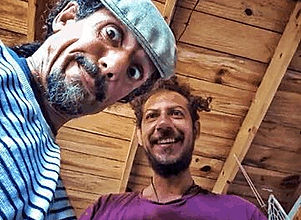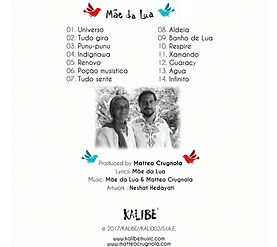
ALBUMS
All albums are available for streaming and digital download (on this website or on iTunes, Amazon, CDBaby, etc...).
Physical CDs are also available, contact me to buy them!
Sambola (2020)
As a delicious meal with dishes from several cultures, Sambola means "mixed salad" and features collaborations and spices from many different countries and traditions. Eleven original tracks sung in sinhala, portuguese, french, arabic, spanish (and more) to describe the magic of multiculturalism!


"Samboleros": who took part at the recordings of the album
1. Cani Huertas: cajon (8)
2. Alessandro Dall’aglio: percussions (9)
3. Nabil Diouri: clarinet (2)
4. Ermanno Panta: sax (3), flute (8, 11)
5. Nano Marbella: coro (10)
6. Isidoro Aparicio Tercero: cello (2, 4)
7. Joaquin Sanchez Gil: clarinet (1, 4, 9)
8. Sia & Aldo: voice (7)
9. Miguel Julia Garrido: kalimba (7)
10. Lamine Seraoui: voice (2,3)
11. Rashini Wickramasinghe: voice (1, 3)
12. Juanillo: voice (3, 9, 10)
13. Matteo Crugnola: guitars, cavaquinho, charango, mini harp, percussions (1, 3, 4, 5, 7, 11), kalimbas (3, 8, 11)
14. Alicia Tamariz: voice (5, 8)
15. Juan Carlos Camacho: trumpet (5, 9)
16. Javier Perez: percussions (riqq, bendhir)(1, 2, 4)
17. Roberto Mattei: double bass
18. Isabelle Liptay: voice (3)
19. Marco Modica: violin (2, 11)
20. India Mae da Lua: berimbau (1)
21. Rubens Silva: flamenco guitar (10)
22. Jorge Dopico: trombone (9)
23. Jose Morrison: electric guitar (9)
24. Karima Toré Gürsel: sax (9)

Mastering by Andrea Pellegrini
Cover artwork by Neshat Hedayati





"The idea of this album started more than 3 years ago, but if I think it well the real beginning of this project is over 10 years ago, when I first met a very special human being and a great friend: Juanillo. He’s a poet, educator and guitar player -amongst other things - and soon we realized we had a deep musical connection. His ideas to me were like magical seeds, he could play a 5 second riff but in my mind that was the key to a whole song with lots of instruments and voices.
For years we talked about making music together or recording something, but I guess we enjoyed so much improvising and sharing weird musical ideas that we didn’t take it seriously. Then, as sometimes happens in life, suddenly coincidences started a flow that we could hardly control; we began recording sketches of songs and several talented friends came around to participate in the recordings.The basic ingredients were there. Immediately after those recordings he left to live in South America, and I kept on with the arranging/recording/mixing process.
The meal was already cooking in the oven!"
Matteo
"Cuando te lo estás pasando bien es difícil inventar un plan mejor. Simplemente nos limitamos a obedecer esa energia que nos mantiene hipnotizados sin pensar mucho en descubrir por qué. Parece como si el objetivo fuera no bajarse de las nubes y seguir en esa alfombra voladora todo el tiempo que la magia lo permita. Así que las semanas que estuvimos grabando sambola fueron una especie de carnaval improvisado donde a medida que sonaba la música íbamos invitando a más gente a unirse a la fiesta por esa necesidad humana de compartir el placer en compañia y también porque las canciones necesitaban manos, pieles, voces y espiritus que las encarnasen mientras cobraban vida Y así se fue alargando la fiesta y la alegría hasta hoy, que os presentamos aquí esta aventura musical con una variada tematica que va desde el misterio más disonante hasta el jaleo más festivo, desde las propuestas mas terrenales hasta los ritmos mas irregulares, desde la comedia más disparatada hasta el canto más profundo, voces en varias lenguas que nos llevan de paseo por el mundo, con la intención de que la fiesta de la música no termine, sino que solo acabe de empezar".
Juanillo
About Sambola...



Mãe da Lua (2017)
Heart and voice of this album is Mãe da Lua, a poet, singer, musician and activist from Brazil. With her deep and intense voice she sings about the need to preserve the environment, the meaning of existence, and the importance of universal love. She investigates tribal languages, music and culture; all songs have a strong message of tolerance and peace, with the belief that music can unite people.


Featuring:
India Mãe da Lua: voice, flutes, percussions, ngoni
Matteo Crugnola: guitars, charango, cavaquinho, percussions, kalimbas, setar, bass, sounds
Ermanno Panta: flute, sax, pandeiro

Linda & Sergio: voice (8)
Marco Modica: violin (5, 9, 12, 13)
Joaquín Sánchez Gil: clarinet (10)
Andrea Stanzione: double bass (13)
Imad: guembri (4)
Alex Dell’Aglio: snare&charleston (6)
Maggie, Valentina, Astrid, Elisa, and many more: choir (3, 6, 12)
Cover artwork by Neshat Hedayati, photo by Karolina Daria




“I first met India Mae da Lua in 2004, when we were both street musicians in the South of Spain. She had just arrived in Europe and was traveling with sooo many instruments that she couldn’t carry them by herself and always had some friend around helping her. I remember I was really impressed by her approach to music: she used to arrive in a square, lay down a carpet and put several percussions, flutes, guitars and weird instruments on the ground, as if it was a ritual. Then she started playing and singing, inviting people to grab an instrument and play along with her. For her music was first of all a matter of sharing, she really believed in the power of unification that Music has. Her voice was so strong and charismatic and her message so clear to transcend language barriers. She lived with me and Ermanno Panta for a few months and we were playing music all the time. Then she went back to Brasil. In the following decade we kept in touch but met only a couple of times. At the end of 2015 I called her and asked if she ever recorded the songs we were playing together. She answered no, telling me that for some time she’d been praying the sky for somebody to help her recording and arranging those songs and many others. That was the beginning of this album!”
La Danse d'Harmattan (2011)

Ermanno Panta: flute, pandeiro, voice (4)
This album was written and recorded in Ouagadougu, during a journey to Burkina Faso. The meeting with local musicians inspired this project, a bridge between different cultures where the sound of western instruments blends with traditional African instruments and voices to tell the magic of this meeting. The songs tell stories of day to day life, young people who migrate in pursuit of their dreams and villages that become empty in the name of modernity.

Djiga "Papa" Aboubacar:
djeli 'ngoni, percussions, 'ngoni bass

Seydou Traorè:
voice (1,3)

Tim Winsey:
voice (2,5)

Robert Tiendrebeogo:
calebasse (1,4)

Khanzai:
voice (5)



